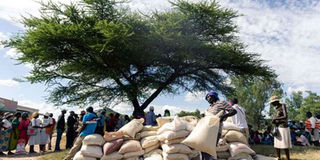UN warns of mass starvation in Zimbabwe as drought bites

Residents of rural Mutoko in Zimbabwe get relief food on March 13, 2019. A UN expert has warned of a looming mass starvation in Zimbabwe as the effects of a severe drought and a collapsing economy take their toll. PHOTO | FILE | AFP
What you need to know:
- The UN report said Zimbabwe was amongst the four highest food insecure African states.
- President Emmerson Mnangagwa has been struggling to reverse an economic collapse.
- An estimated 2.2 million people are food-insecure and lack access to minimum public services.
Harare
A United Nations expert has warned of a looming mass starvation in Zimbabwe as the effects of a severe drought and a collapsing economy take their toll.
A preliminary report by UN Special Rapporteur Hilal Elver on the right to food, said Zimbabwe was amongst the four highest food insecure African states, “alongside conflict ravaged countries.”
Ms Elver issued the report on Thursday as she concluded an 11-day fact finding mission to Zimbabwe.
MAN-MADE STARVATION
“The people of Zimbabwe are slowly getting to a point of suffering a man-made starvation,” she said.
“Political polarisation, economic and financial problems and erratic climatic conditions all contribute to the storm of food insecurity currently facing a country once seen as the breadbasket of Africa.”
The UN estimates that 7.7 million Zimbabweans or half of the population is food insecure after a drought during the 2018/2019 farming season.
FOREIGN CURRENCY
Zimbabwe, which is in a deep economic crisis, is also short of foreign currency to import the staple maize.
Ms Hilal said the crisis has been worsened by poor economic policies, sanctions imposed by Western countries and deep rooted corruption.
“With its large reserves of gold, platinum, diamonds and other metals and minerals, as well as fertile agricultural lands, the country still has an enormous economic potential, which could lift the entire region,” she added.
“Good fiscal and economic governance could change the course of Zimbabweans’ economic and social conditions, particularly their right to food.
“It is the primary responsibility of the government of Zimbabwe to ensure that the right to food of its citizens is respected, protected and fulfilled.”
ECONOMIC COLLAPSE
President Emmerson Mnangagwa, who came into power in 2017 following a military coup, has been struggling to reverse an economic collapse that has been blamed on populist policies rolled by his predecessor Robert Mugabe.
The policies include a chaotic land reform programme almost two decades ago, which resulted in the collapse of the country’s agriculture sector, once the backbone of the economy.
Zimbabwe now imports most of its food requirements but the country has been facing serious shortages of foreign currency.
FOOD-INSECURE
“More than 60 percent of the population of a country once seen as the breadbasket of Africa is now considered food-insecure, with most households unable to obtain enough food to meet basic needs due to hyperinflation,” Ms Elver added.
“In rural areas, a staggering 5.5 million people are currently facing food insecurity, as poor rains and erratic weather patterns are impacting harvests and livelihoods.
She said in urban areas, an estimated 2.2 million people are food-insecure and lack access to minimum public services, including health and safe water.
“These are shocking figures and the crisis continues to worsen due to poverty and high unemployment, widespread corruption, severe price instabilities, lack of purchasing power, poor agricultural productivity, natural disasters, recurrent droughts and unilateral economic sanctions,” Ms Elver said in her report.





